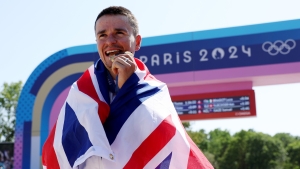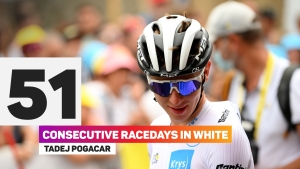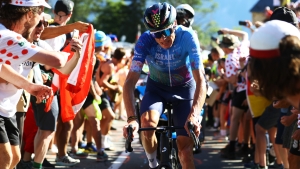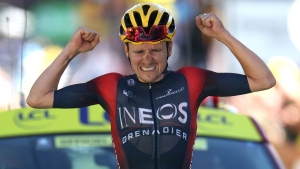Jonas Vingegaard went into the final weekend of the Tour de France with his yellow jersey all but assured.
It is the mountain stages that so typically settle the general classification in Grand Tours, and this edition of Le Tour proved no different.
A dominant ride on stage 18 saw Vingegaard, with admirable support from Sepp Kuss and Wout van Aert, drop two-time defending champion Tadej Pogacar on the final ascent in the Pyrenees.
Vingegaard powered away on that last climb, leaving Pogacar in his wake, and well over three minutes behind overall in the hunt for the yellow jersey, as the Dane collected just a second Grand Tour stage win of his career, the first having come on July 13 to put him in command of the race.
That left Vingegaard merely needing to safely negotiate the final three stages – two sprint finishes and a time trial – and he did just that, parading into Paris on Sunday with his grip on the yellow jersey firmly intact. Now he is the champion, a remarkable feat considering where he has come from.
Pogacar's Slovenian compatriot Primoz Roglic has previously been Jumbo-Visma's main hope, but an exceptional team ride has also represented a passing of the baton to Vingegaard, the 25-year-old who four years ago was working at a fish factory to supplement his income. Vingegaard was recruited by the team based on a remarkable time up a daunting climb in Spain, which was subsequently posted to the popular training application Strava.
Jumbo-Visma have turned in a team performance for the ages. Their plan, and subsequent execution, has been near-perfect. Even the loss of Roglic, whose attention will now turn to winning yet another Vuelta a Espana title, could not derail this powerhouse unit heading into the final week.
Vingegaard's first win, on stage 11 up the Col du Granon, came as a result of Jumbo-Visma attacking early, luring Pogacar into responding, and draining the Slovenian's energy as the 23-year-old was proven to be a mere mortal after all.
Even when stacked up against the days of when Team Sky (now INEOS Grenadiers) dominated Le Tour, Jumbo-Visma's performance this time around has been something special. As a result, they are the first team to win the yellow, polka dot (Vingegaard) and green (Van Aert) jerseys at the same edition of the race since Faema managed the feat in 1969, thanks to the great Eddy Merckx.
Vingegaard is the second Dane to win the Tour de France after Bjarne Riis in 1996, and it is the first time since 1992 that the winner of the race has been a native of the country where it started, with the first three stages of this Tour having taken place across Denmark.
Not since 2006 (Michael Rasmussen) has a Dane won the polka jot jersey, though it is the third successive edition of Le Tour that the GC leader has also claimed the King of the Mountains classification, with Pogacar having done so in 2020 and 2021. Before 2020, it had happened only three times across the previous 50 races – Merckx in 1970, Carlos Sastre in 2008 and Chris Froome in 2015.
Van Aert, meanwhile, is another star. The 27-year-old finished in second place in the opening three stages before finally claiming victory at the fourth time of asking, and his decisive attack on Hautacam gave Vingegaard the platform he needed to end Pogacar's hopes.
A sprinter by trade but a brilliant climber to boot, Van Aert never looked likely to relinquish the green jersey, easily fending off Jasper Philipsen and Pogacar for that prize. He is the first Belgian rider to win the points classification of the Tour de France since Tom Boonen in 2007.
As for Pogacar, three in a row proved one triumph too many, but when you contrast the talents of UAE Team Emirates with Jumbo-Visma, his achievements so far must be considered even more remarkable.
The white jersey, which Pogacar won in each of the last two years for the best young rider, was retained. He has been leading the youth classification over each of the last 51 racedays in the Tour de France (from stage 13 in 2020 to stage 21 in 2022), which is the longest run of consecutive racedays in the first place of a specific classification.
Pogacar will surely be back out to regain his crown in 2023 and along with Vingegaard could dominate for years to come, though do not count out Tom Pidcock from one day contesting for a jersey.
On his Grand Tour debut, the 22-year-old Briton has mightily impressed. His triumph on the famous Alpe d'Huez will go down in the record books. He not only broke the 100km/h mark on a descent, but became the youngest stage winner on the mountain in Le Tour history, breaking a 38-year record held by Lucho Herrera.
Pidcock, who won gold on the mountain bike at the Tokyo Olympics, is the 15th British rider to win a Tour de France stage, but just the second to do so on the Alpe d'Huez after Geraint Thomas, who at 36 has battled to a brilliant third-place finish overall.
It might well be the 2018 champion's swan song at Le Tour, while another veteran campaigner, Nairo Quintana, came in sixth in the general classification. That is Quintana's first top-10 Grand Tour finish since the 2019 Vuelta a Espana, and his best performance in this race since 2016.































